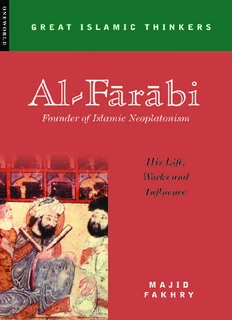Table Of ContentGREAT I SLAMIC THINKERS
Al-Fa¯ra¯bi,
Founder of Islamic
Neoplatonism
His Life, Works and Influence
RREELLAATTEEDD TTIITTLLEESS PPUUBBLLIISSHHEEDD BBYYOONNEEWWOORRLLDD
MuslimWomen Mystics: The LifeofRabi‘a and Other WomenMystics in Islam, Margaret
Smith, ISBN 1–85168–250–3
FaithandReasoninIslam:Averroes’ExpositionofReligiousArguments,editedandtranslated
by IbrahimNajjar,ISBN 1–85168–263–5
Averroes:His Life,Worksand Influence, MajidFakhry, ISBN 1–85168–269–4
Rumi–PastandPresent,EastandWest:TheLife,TeachingsandPoetryofJalaˆlal-DinRumi,
Franklin D. Lewis,ISBN1–85168–214–7
GREAT I SLAMIC THINKERS
Al-Fa¯ra¯bi,
Founder of Islamic
Neoplatonism
His Life, Works and Influence
MAJID FAKHRY
AL-FA¯RA¯BI, FOUNDER OF ISLAMIC NEOPLATONISM:
HIS LIFE, WORKS AND INFLUENCE
OneworldPublications
(SalesandEditorial)
185BanburyRoad
OxfordOX27AR
England
www.oneworld-publications.com
#MajidFakhry2002
Allrightsreserved.
CopyrightunderBerneConvention
ACIPrecordforthistitleisavailable
fromtheBritishLibrary
ISBN1–85168–302–X
CoverdesignbyDesignDeluxe
Coverpicture:SchoolatAleppo,Syria,ArabManuscriptbyMaqamat
dAlHariri,#theartarchive/Bibliothe`quenationaledeParis/Josse.
TypesetbyLaserScriptLtd,Mitcham,UK
PrintedandboundbyBell&BainLtd,Glasgow
NL08
Contents
Preface vii
Introduction 1
1. LIFE AND WORKS 6
2. AL-FA¯RA¯BI AND THE GREEK LEGACY 10
The genesis of philosophy 10
Philosophy and religion 12
Presocratics, stoics and peripatetics 15
Plato and his philosophy 16
The philosophy of Aristotle 25
The harmony of Plato and Aristotle 31
3. THE CLASSIFICATION OF THE SCIENCES 40
The interrelation of the sciences 40
Logic and mathematics 41
Physics and metaphysics 44
Ethics and politics 48
The Islamic sciences 49
4. AL-FA¯RA¯BI AS LOGICIAN 52
The logical corpus 52
The analysis of logical terms 53
The demonstrative art 57
Rhetoric and poetics 60
5. THEORY OF KNOWLEDGE 66
The nature of scientific knowledge 66
vi Al-Fa¯ra¯bi, Founder of Islamic Neoplatonism
The various senses of the term ‘intellect’ (‘aql) 70
The Active Intellect 73
6. EMANATION VERSUS CREATION 77
The Neoplatonic legacy 77
The nature of the First Being or the One 79
The intellect, as the first emanation 82
The heavenly bodies 83
The material world 85
The human soul and its faculties 86
Prophecy and the imaginative faculty 88
7. ETHICAL THEORY 92
The attainment of happiness 92
The moral virtues and their acquisition 93
Evil and not-being 95
Justice and friendship 99
8. POLITICAL THEORY 101
The principles of political association 101
The master organ and the master ruler (ra’¯ıs) 102
The qualification of the chief ruler (ra’¯ıs) 103
The virtuous city 105
The non-virtuous cities 107
The outgrowths (nawa¯bit) as a hybrid class 112
Lawlessness and discord 113
Political justice and religious piety 114
The fate of the soul after death 117
9. AL-FA¯RA¯BI AND MUSIC 123
10. AL-FA¯RA¯BI IN HISTORY 128
The triumph of Neoplatonism 128
Al-Fa¯ra¯bi’s philosophical legacy 129
Al-Ghaza¯li’s onslaught on Al-Fa¯ra¯bi and Ibn S¯ına 135
Ibn Ba¯jjah and the Andalusian interlude 136
Ibn Rushd (Averroes) 140
Neoplatonism and Sufism 146
Al-Fa¯ra¯bi and the West 148
Conclusion 151
Appendix 156
Bibliography 161
Index 166
Preface
It is generally acknowledged that the first genuine Muslim philosopher
was Abu¯ Ya‘qu¯b al-Kindi (d. c. 866), whose learning was very vast, as
illustrated by his writings on almost all the sciences known in his day,
ranging from astronomy to psychology, physics and metaphysics.
However, judging from the few writings of this Arab philosopher to have
survived,al-Kinditended to beeclecticaland rhapsodicin thediscussion
ofhisprincipalthemes.ThefirstsystematicphilosopherinIslamwasAbu¯
Nasral-Fa¯ra¯bi(d.950),towhomthisvolumeisdevoted.Hedevelopedan
˙
elaborate emanationist scheme, affiliated to the metaphysics and
cosmology of Plotinus (d. 270) and Proclus (d. 450), known as
Neoplatonism,whichhadnoprecedentintheworldofIslam.Inaddition,
hewrotethefirstMuslimpoliticaltreatise,inspiredbyPlato’sRepublicand
knownastheOpinionsoftheInhabitantsoftheVirtuousCity.Hewasalsothe
firstoutstanding logicianofIslam,andparaphrasedorcommentedonthe
whole Aristotelian logical corpus, known as the Organon.
Despite this significant contribution to the history of philosophy and
logic, al-Fa¯ra¯bi has received very little attention in the West.
M. Steinschneider published in 1889 the first monograph on al-Fa¯ra¯bi,
and F. Dieterici published in the next year a collection of his writings
accompanied with a German translation. In 1934, Ibrahim Madkour
publishedhisLaPlaced’al-Fa¯ra¯bidansl’e´cole philosophiqueArabe.Allofthese
viii Al-Fa¯ra¯bi, Founder of Islamic Neoplatonism
valuable works, however, antedate the discoveryand publication of many
of al-Fa¯ra¯bi’s works, especially in the field of logic. In that area, the
editions and translations of M. Mahdi and D.M. Dunlop are particularly
noteworthy.
Ihavetriedinthepresentvolumetogiveacomprehensiveaccountof
al-Fa¯ra¯bi’s contribution to logic, political theory, metaphysics and music,
while highlighting his role as a major link in the transmission of Greek
philosophy to the Arabs and his impact on subsequent philosophers, in
boththeMuslimworldandtheLatinWest.Thebibliographyattheendof
the book will reveal the vast scope of al-Fa¯ra¯bi’s contribution and his
influence.
Majid Fakhry
Introduction
Abu¯ Nasral-Fa¯ra¯bi(870–950),generallyreferredtointheArabicsources
˙
as the Second Teacher (al-Mu‘allim al-Tha¯ni), occupies a unique position
in the history of philosophy, as the link between Greek philosophy and
Islamicthought.HisstandinginthehistoryofAristotelianlogicispivotal;
no logician of any significance arose anywhere during the period
separatingBoethius(d.525),theRomanconsul,whotranslatedAristotle’s
logicalworksintoLatin,andAbe´lard(d.1141)inWesternEurope.Ofthe
Arab philosophers who preceded al-Fa¯ra¯bi, al-Kindi (d. c. 866), a great
championofGreekphilosophy,whichwasinperfectharmonywithIslam,
accordingtohim,doesnotappeartohavemadeasignificantcontribution
to logic, although in other respects his learning was vast. Al-Ra¯zi (d. c.
925)hadthehighestregardfortheGreeks,andinparticularforPlato,‘the
master and leader of all the philosophers’, but regarded philosophy and
religion as incompatible. As the greatest non-conformist in Islam, he
rejected the whole fabric of revelation and substituted for the official
Islamic view five co-eternal principles, the Creator (Ba¯ri’), the soul,
matter, space and time, inspired in part by Plato and the Harranians.
It will be shown in due course howal-Fa¯ra¯bi, in a lost treatise on the
RiseofPhilosophy,tracedthehistoryof Greekphilosophyfromthetimeof
Aristotle, as it passed through the Alexandrian medium, during the
Ptolemaic period, down to the Islamic period and up to his own time.
Description:fragments from the Phaedo, the Apology and the Crito. In his treatise the Philosophy of Plato, Its Parts and the Order of Its Parts, al-Fa¯ra¯bi appears to

